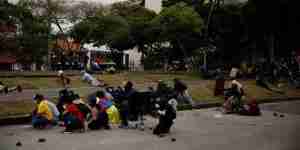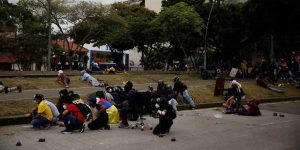Colombia Deploys Troops
BOGOTÁ, Colombia—President Ivan Duque ordered troops deployed across a swath of Colombia to bring order after a month of antigovernment protests that have left more than 25 people dead and hobbled Latin America’s fourth-largest economy.
Some 7,000 soldiers were to be sent out Saturday and in the coming days in the southwestern province of Valle del Cauca and the city Cali, which erupted into violence Friday that officials said left at least five people dead.

The president announced Friday his government would go with a “maximum deployment” of soldiers to assist police, who have been locked in almost daily confrontations with protesters in Cali. Demonstrators have targeted police with rocks, Molotov cocktails and sometimes firearms; the police have responded with tear gas and, in some cases, gunfire, videos of the encounters show.
“This deployment will almost triple our capability in less than 24 hours throughout the province,” Mr. Duque said. As of Saturday, more than 1,140 troops had arrived in Cali and began dismantling the roadblocks that antigovernment demonstrators have assembled on major thoroughfares.
The government is aiming to beef up security forces in places where Mr. Duque said authorities “have seen acts of vandalism, violence and low-intensity urban terrorism.” Army and marine troops were to be deployed in the country’s key Pacific port, Buenaventura, and in a total of 10 of Colombia’s 32 provinces.
The deployment comes after protesters engaged in deadly clashes Friday at blockades, and videos went viral showing men in civilian attire firing handguns as police officers stood nearby without trying to stop them. Gen. Fernando Murillo, who oversees the police force’s criminal investigations division, said the police officers at the scene should have apprehended the gunmen and are being investigated.
Jose Miguel Vivanco, the Americas director of Human Rights Watch, raised concerns about deploying troops.
“The orders issued do not include any explicit reference to prioritizing dialogue, avoiding excessive force and respecting human rights,” Mr. Vivanco said on Twitter. He said the deployment of forces could have “irreparable consequences.
Mr. Duque said the troops would be strictly supervised and respect the constitution. “This force acts to protect citizens and has maximum support, but at the same time operates under maximum oversight,” the president said.
On Saturday, he toured Cali and met with residents who had complained about roadblocks that prevented them from going to work and supermarkets from stocking shelves.
Among the hardest hit cities in the country are three just outside of Cali where protesters in recent days have torched buildings, including municipal offices and courts. Televised images earlier in the week of the century-old palace of justice in flames in the city of Tuluá stunned Colombians and judicial authorities, who said the destruction incinerated important case files.
Colombia erupted in violence on April 28, after Mr. Duque’s government proposed a tax overhaul that would have increased sales taxes. As protests expanded across the nation, demonstrators from various walks of life called for myriad state benefits and vast changes to the country’s economic model even as Mr. Duque withdrew his proposed tax code.
Most of those at the blockades and protests are young Colombians who have been hit hard by the high unemployment that resulted from Covid-19 lockdowns. The coronavirus has killed more than 87,000 people in the country.
“There’s no future for young people as things are now,” said Sergio Briceño, a 20-year-old laborer who spoke at a roadblock near the Colombian capital of Bogotá. “This is why we’re fighting here for a future.”
Government negotiators have met regularly with a so-called strike committee made up mostly of trade union leaders. In exchange for calling off protests, they initially made more than 100 demands that included a prohibition on hydraulic fracking, new restrictions on mining, an end to certain taxes, and limits on the privatization of state firms.
There is now a pared-down list of demands that include a basic guaranteed income for more than half of the country’s 50 million people, a moratorium on home-mortgage payments, a range of subsidies and a free university education. The committee negotiating with the government wants authorities to print money, dip into international reserves and temporarily halt foreign debt payments to fund the wish list.
Read Also: Canadian Discovers Remains of Boarding School Students
Copyright ©2020 Dow Jones & Company, Inc. All Rights Reserved. 87990cbe856818d5eddac44c7b1cdeb8


